"I need to produce great ideas, and I believe that if I were commissioned
to design a new universe, I would be mad enough to undertake it."
to design a new universe, I would be mad enough to undertake it."
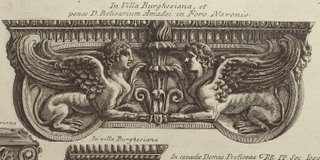
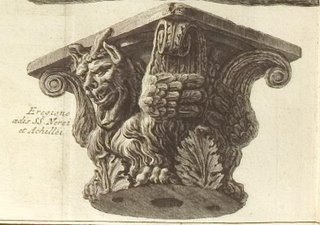
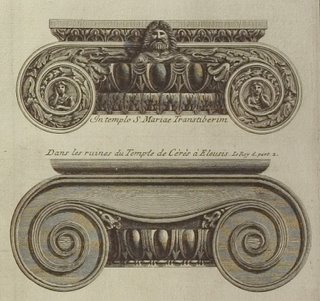


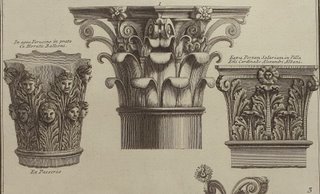
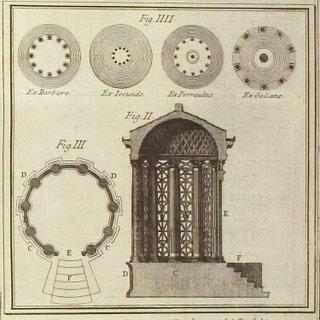
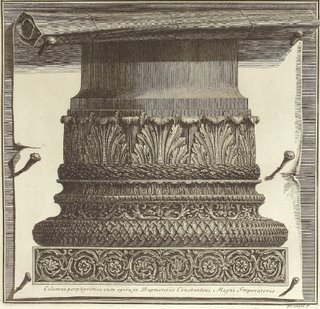




[click the images for much larger versions]
Giovanni Battista Piranesi (1720-1778) had a Venetian family background in stonemasonry and engineering but apprenticed as an engraver/etcher in Rome from about the age of 19. He would no doubt assert that he was primarily an architect but only a single unremarkable church was ever built from his plans.
Encouraged by his brother to study the antiquities and tutored in Rome by Giuseppe Vasi who produced scenic Roman prints, Piranesi developed a fascination for ancient architecture. He would continue all his life producing plates for a series documenting Roman buildings, among a legacy of some 2000 etchings and engravings.
Piranesi was remarkable in the way he infused his work with dramatic design elements and a healthy and sometimes dark imagination. His famous Carceri d'Invenzione ('Imaginary Prisons') series of illusory gothic dungeons calls to mind Kafka and Escher and Victorian horror scenes. He was 22 when the set of 16 prints was made.
Although he was familiar with (and indeed illustrated) ancient Greek and Egyptian architecture, Piranesi was a champion for the Roman style and where time had erased detail he substituted elaborate ornamentation from his own imagination. His highly original work would influence neoclassical designers, romantic writers and surrealists alike.
Francesco Piranesi (son) 1831:
"In an age of frivolities, he boldly and singlehandedly dared to strike out for himself on a new road to fame: and in dedicating his talent to the recording and illustrating from ancient writers the records of former times, he met with a success as great as it deserved, combining, as he did, all that was beautiful in art with all that was interesting in the remains of antiquity."All of the images above are details taken from Della Magnificenza Ed Architettura De'Romani / De Romanorvm Magnificentia Et Architectura 1761 (38 plates) and Osservazioni Di Gio. Battista Piranesi sopra la Lettre de M. Mariette aux auteurs de la Gazette Littéraire de l'Europe 1765 (3 plates) from the University of Heidelburg (click 'Tafeln' for the illustrations). Be aware: if you click '+' at bottom of any page, the zoom loads as a pdf file - these are enormous when saved as jpeg images.
I am greatly indebted (again) to misteraitch for having stoked my interest with some background links.
- Some images and a review of Piranesi's work at the Metropolitan Museum.
- Illustrations de Antichita Romanae 1748-1791 at Gallica-BNF (914 pages)
- The Engravings of GB Piranesi, and other Plans of Rome - a large selection of images.
- Some short biographies of Piranesi.
- 'Engravings by Piranesi' (137 images)
- UPDATE: NYT article October 2010 - Piranesi's Elevated Etchings.
As is the custom here at a centenary post (500) I reiterate the invitation to anyone who knows of suitable BibliOdysseyesque material online to contact via email or as a comment. By preference I most desire works relating to the less well represented areas of the world (you know, the not-Western Europe/not-USA sections) but I'm still happy to hear about any and all books/prints/repositories and the somesuch. I have an enormous number of links saved so this encouragement is not a signal that the well is dry or that my brain has yet seized. Cheers.
Five-hundred posts at the quality you’ve maintained, & in a relatively short space of time, is a spectacular achievement: Bravo!
ReplyDeleteThanks maestro, I'm sure the digital flotsam here will one day be used against me in a psychiatric evaluation.
ReplyDeleteJust for a spot of posterity, misteraitch has found a massive collection of Piranesi prints at the University of Tokyo. High resolution and excellent quality - better than those at Australian National University.
ReplyDelete